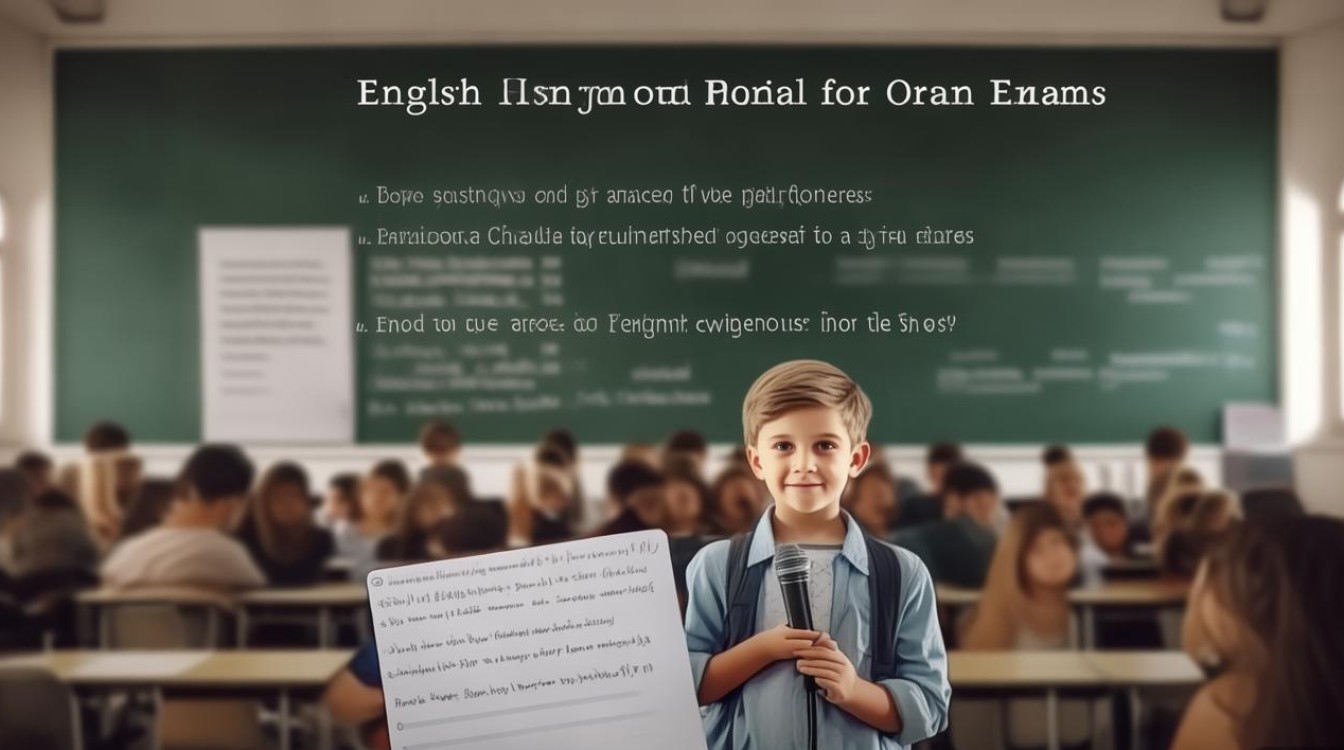第一部分:开场与自我介绍
这部分是考试的“门面”,清晰、自信的开场能给考官留下好印象。

基础版
- Good morning/afternoon, sir/madam.
早上好/下午好,先生/女士。
- Good morning/afternoon, my examiners.
早上好/下午好,各位考官。
- My name is [Your Name]. (My name is Li Ming.)
我的名字是[你的名字]。
- I'm from [Your School/Organization]. (I'm from Beijing Foreign Studies University.)
我来自[你的学校/单位]。
- I'm very happy to be here for this interview.
很高兴能来参加这次面试。
- Thank you for giving me this opportunity.
感谢您给我这次机会。
进阶版
- Good morning/afternoon, it's a great honor to be here for this interview.
早上好/下午好,很荣幸能来这里参加面试。
- Good morning/afternoon, my name is [Your Name], and it's a pleasure to meet you.
早上好/下午好,我叫[你的名字],很高兴见到您。
- I am delighted to have the opportunity to introduce myself.
我很能有这个机会做自我介绍。
- (When asked about your hometown) I come from [City Name], a beautiful city in [Province]. It's famous for [something famous, e.g., its history, food, or scenery].
(当被问及家乡时)我来自[城市名],是[省份]的一座美丽城市,它以[著名的事物,如历史、美食或风景]而闻名。
第二部分:常见话题与回答思路
口语考试常围绕个人生活、学习、工作、兴趣爱好等话题展开。
关于个人
-
Tell me about yourself.
- 思路: 不是简单重复简历,而是用2-3句话概括你的核心特点,可以包括:你的专业/工作、你的主要性格、你的一个优点。
- 范例: "I am a final-year student majoring in Computer Science. I'm a curious and detail-oriented person who enjoys solving complex problems. In my free time, I love hiking, which helps me stay energetic and focused."
-
What are your strengths and weaknesses?
- Strengths (优点):
- "I would say my biggest strength is my ability to work well in a team. I enjoy collaborating with others and believe that teamwork leads to the best results."
- "I'm a quick learner and I'm very adaptable to new environments and challenges."
- Weaknesses (缺点): 关键: 说一个真实但无伤大雅的缺点,并说明你正在如何改进。
- "Sometimes I can be a bit of a perfectionist, which means I might spend a little extra time on tasks to make sure they're done right. However, I'm learning to manage this and prioritize my work better."
- "In the past, I was a bit nervous about public speaking, but I've been actively practicing by joining a debate club, and I've seen a huge improvement."
- Strengths (优点):
关于学习与工作
-
Why did you choose your major/current job?
- 范例: "I chose to study marketing because I've always been fascinated by how brands connect with people. It's a dynamic field that combines creativity and strategy, and I find it very exciting."
-
What is your favorite subject? / What do you like most about your job?
- 范例: "My favorite subject is Artificial Intelligence. I'm particularly interested in machine learning because of its potential to solve real-world problems, like in healthcare or environmental protection."
-
What are your future plans?
- 范例: "In the short term, my goal is to [a specific, achievable goal, e.g., graduate with honors / gain more experience in project management]. In the long run, I aspire to [a broader ambition, e.g., become an expert in my field / start my own company]."
关于兴趣爱好
-
What do you like to do in your spare time?
- 范例: "In my spare time, I'm a big fan of reading, especially science fiction. It allows me to explore new ideas and escape into different worlds. I also enjoy playing the guitar, which is a great way for me to relax."
-
Do you prefer to spend time alone or with others?
- 范例: "I enjoy both. I value my alone time for reflection and pursuing hobbies like reading. At the same time, I love being with my friends and family; we often go hiking or have dinner together, which is always fun and energizing."
第三部分:讨论与互动
如果是小组讨论或双人互动,这些短语会非常有用。
表达观点
- In my opinion / From my point of view, ...
在我看来...
- I believe / I think that ...
我相信/认为...
- As far as I'm concerned, ...
就我而言...
- From my perspective, ...
从我的角度来看...
- The way I see it, ...
我的看法是...
同意与不同意
- Agreeing (同意):
- I totally agree with you.
- You're absolutely right.
- That's a great point.
- I couldn't agree more.
- Disagreeing (礼貌地不同意):
- I see your point, but I have a different perspective. (我明白你的观点,但我有不同的看法。)
- That's an interesting way to look at it. However, I think... (这是一种有趣的看法,我认为...)
- I'm not sure I agree with that. (我可能不太同意。)
- I respect your opinion, but I believe... (我尊重你的看法,但我认为...)
补充与追问
- Adding more information (补充信息):
- Another thing I'd like to mention is...
- In addition / Furthermore, ...
- On top of that, ...
- Asking for clarification (请求澄清):
- Sorry, could you please explain what you mean by...?
- I'm not sure I follow. Could you rephrase that?
- What do you mean by "..."?
引导与总结
- Starting a discussion (开始讨论):
- So, what are your thoughts on this topic?
- Let's start by discussing...
- Moving to the next point (转到下一点):
- Now, let's move on to the next point.
- Okay, so that's the first aspect. What about...?
- Summarizing (:
- So, to sum up, we've discussed...
- In conclusion, the main points are...
第四部分:提问与结尾
在考试的最后环节,提问和礼貌地结束同样重要。
向考官提问
- Do you have any questions for me?
- (经典问题) What are the biggest challenges for someone in this role/program?
(经典问题)这个职位/这个项目对于新人来说最大的挑战是什么?
- What does a typical day/week look like for someone in this position?
这个职位的典型一天/一周是怎样的?
- How would you describe the culture of the company/department?
您如何描述公司/部门的文化?
- What opportunities are there for professional development?
有哪些职业发展的机会?
- (经典问题) What are the biggest challenges for someone in this role/program?
结束
- That's all I have to say. Thank you.
我就说这么多,谢谢。
- I think that covers everything. Thank you for your time.
我想这些就是全部了,感谢您的时间。
- Thank you for the opportunity. It was a pleasure talking to you.
感谢您给我这次机会,和您交谈很愉快。
- I hope I've answered your questions. Thank you.
希望我已经回答了您的问题,谢谢。
高分技巧与注意事项
- 流利度 > 语法完美: 不要因为害怕犯错而停顿太久,说错了没关系,继续说下去,展现你的流利度











